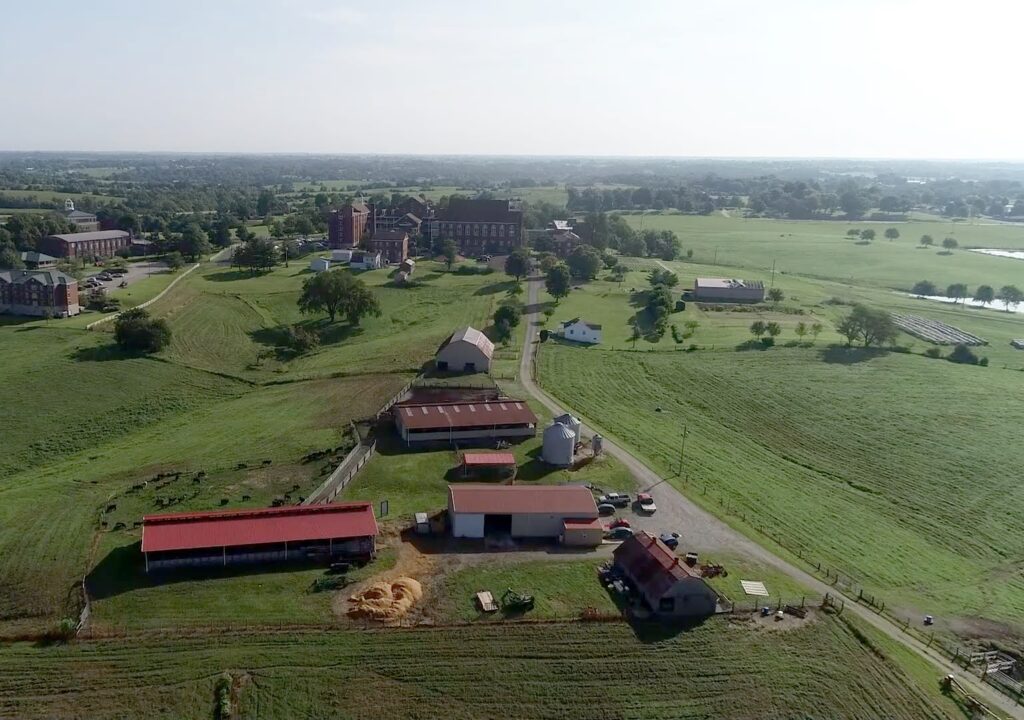The Mission of St. Catharine Farm is to be a learning center through the farm’s witness to a reverent spirituality of Earth, responsible stewardship, and sustainable farming practices.
 St. Catharine Farm had its beginning in 1797 when Alexis and Elizabeth Hamilton Sansbury bought 640 acres of land on Cartwright Creek In 1822, Angela Sansbury brought 53 acres with her to the newly established Dominican community and shared a joint claim with her sister Maria on another 106 acres. The Sisters farmed to furnish the means of their existence. A horse, a cow, and a sheep were given by the Sansburys. Throughout the ensuing years and now centuries, the farm has provided nourishment for the Sisters’ tables.
St. Catharine Farm had its beginning in 1797 when Alexis and Elizabeth Hamilton Sansbury bought 640 acres of land on Cartwright Creek In 1822, Angela Sansbury brought 53 acres with her to the newly established Dominican community and shared a joint claim with her sister Maria on another 106 acres. The Sisters farmed to furnish the means of their existence. A horse, a cow, and a sheep were given by the Sansburys. Throughout the ensuing years and now centuries, the farm has provided nourishment for the Sisters’ tables.
Today, St. Catharine Farm today become a leader both in the local area and in the state for its environmental record and for the quality of its beef. The intensive grazing practiced at St. Catharine Farm is the result of a long-range plan to improve the pastures and maintain a very high quality of beef. Pastures have been divided into smaller paddocks, all with water and shade trees. The cows feed on the grass for a few days and then are moved to another paddock. In this process, the cows eat only the fresh top of the grass for better nutrition and to help them avoid disease, so antibiotics are not needed. Corn and hay for the winter and early spring feed for the cows are grown right here on St. Catharine Farm.
Farmland along a stream, like St. Catharine, has many problems such as erosion, animals fouling the water, and possible contamination of the water by chemicals used in modern farming. A riparian buffer of native grasses and other plants has been planted on St. Catharine Farm to help keep the Cartwright Creek clean. St. Catharine Farm won an award for this buffer project.
This wetland area, which was completed in 2003, consists of five acres of unproductive land near Cartwright Creek This land has been too wet for corn or hay for feed for the cows. It has been planted in warm-season grasses native to Kentucky and attracts deer, wild turkeys, and waterfowl. Gates placed at one end of the wetland control the volume of water and allow draining to let the grasses grow in the warm weather.
St. Catharine Farm cooperates with the University of Kentucky Extension office in Washington County for many of its programs. Several grants from various government departments have made the improvements possible. Collaboration with other local farms benefits the broader rural community of central Kentucky.
Because of its environmentally friendly practices, St. Catharine Farm has become a site for farm field days and demonstrations. Some of the groups that have visited include the National Soil Conservation Service and Washington County Master Cattleman Association. The National Resources Conservation Service held a “National Buffer Training” at St. Catharine Farm.
In an effort to better optimize the gifts of this rich land, Farm Manager Danny Ray Spaulding has planted fruit trees and added an apiary to harvest honey from the bees in the orchard.
Meet the Team
The Mission of St. Catharine Farm is to be a learning center through the farm’s witness to a reverent spirituality of Earth, responsible stewardship, and sustainable farming practices.
St. Catharine Farm will demonstrate farming practices that are sustainable both ecologically and economically; provide healthy, locally produced food while nurturing the vitality of the living system; and collaborate in the education of farm families and the local community.
The Dominican Sisters of Peace serve in ministries across the country and in Nigeria.
Learn more